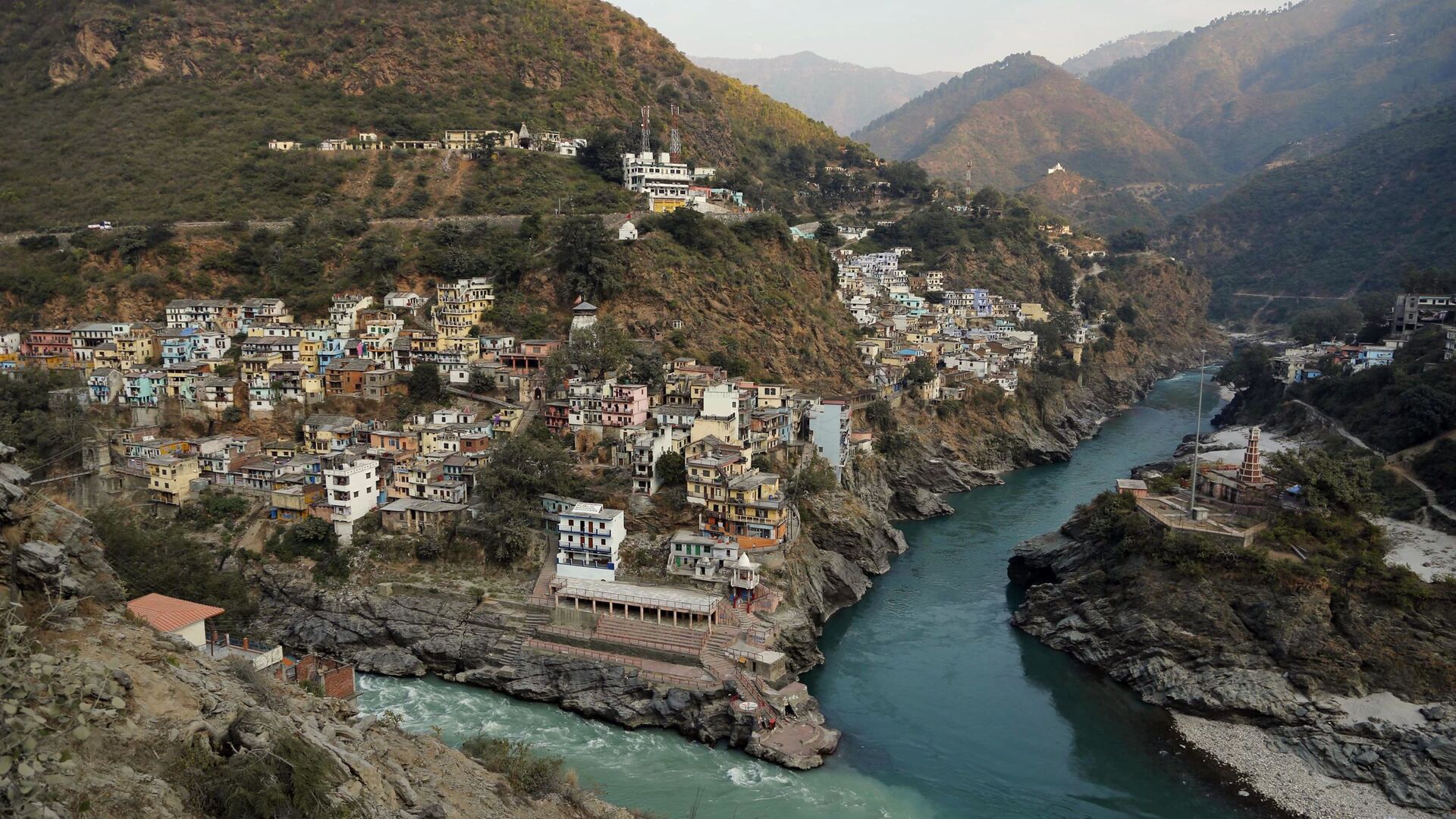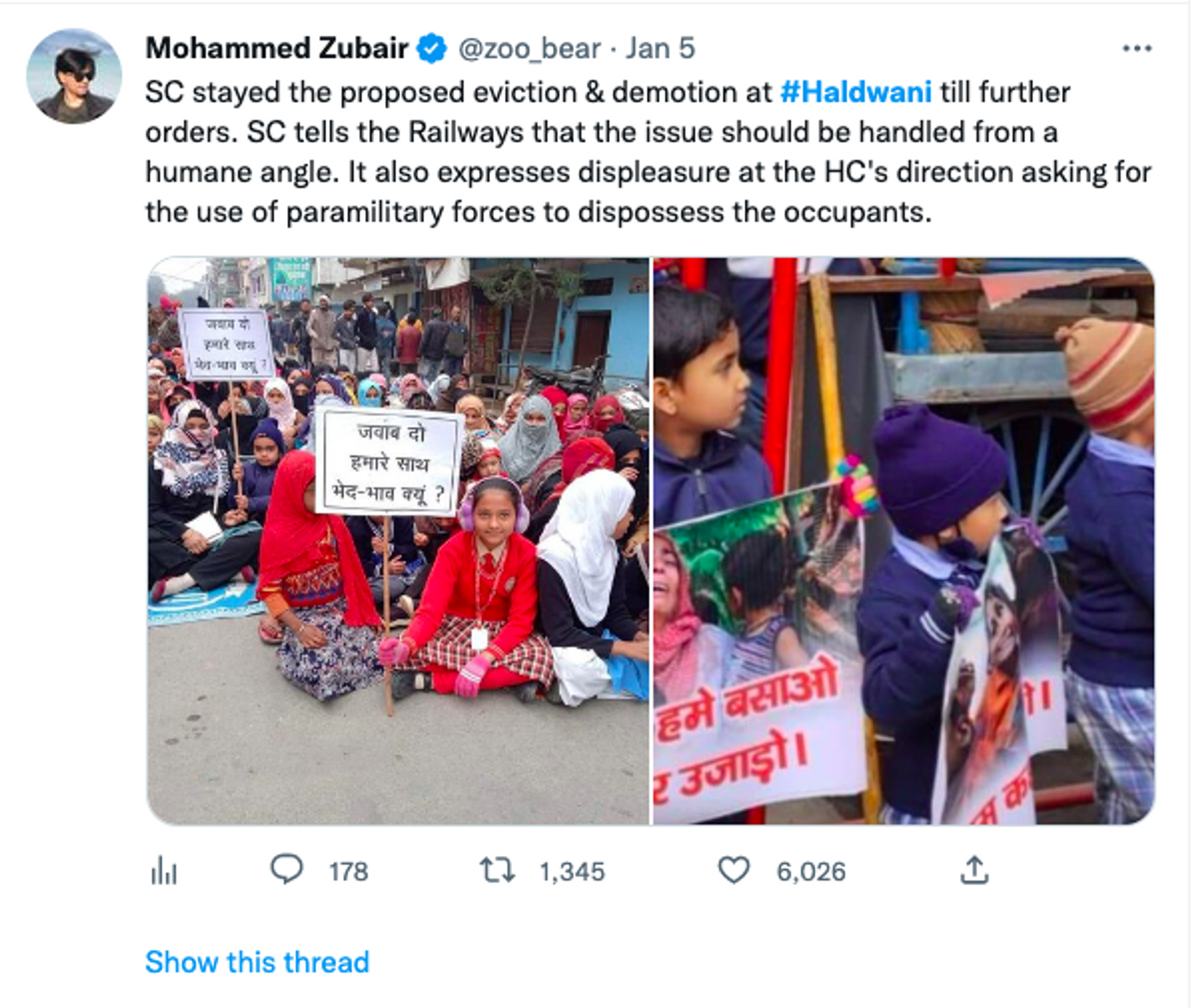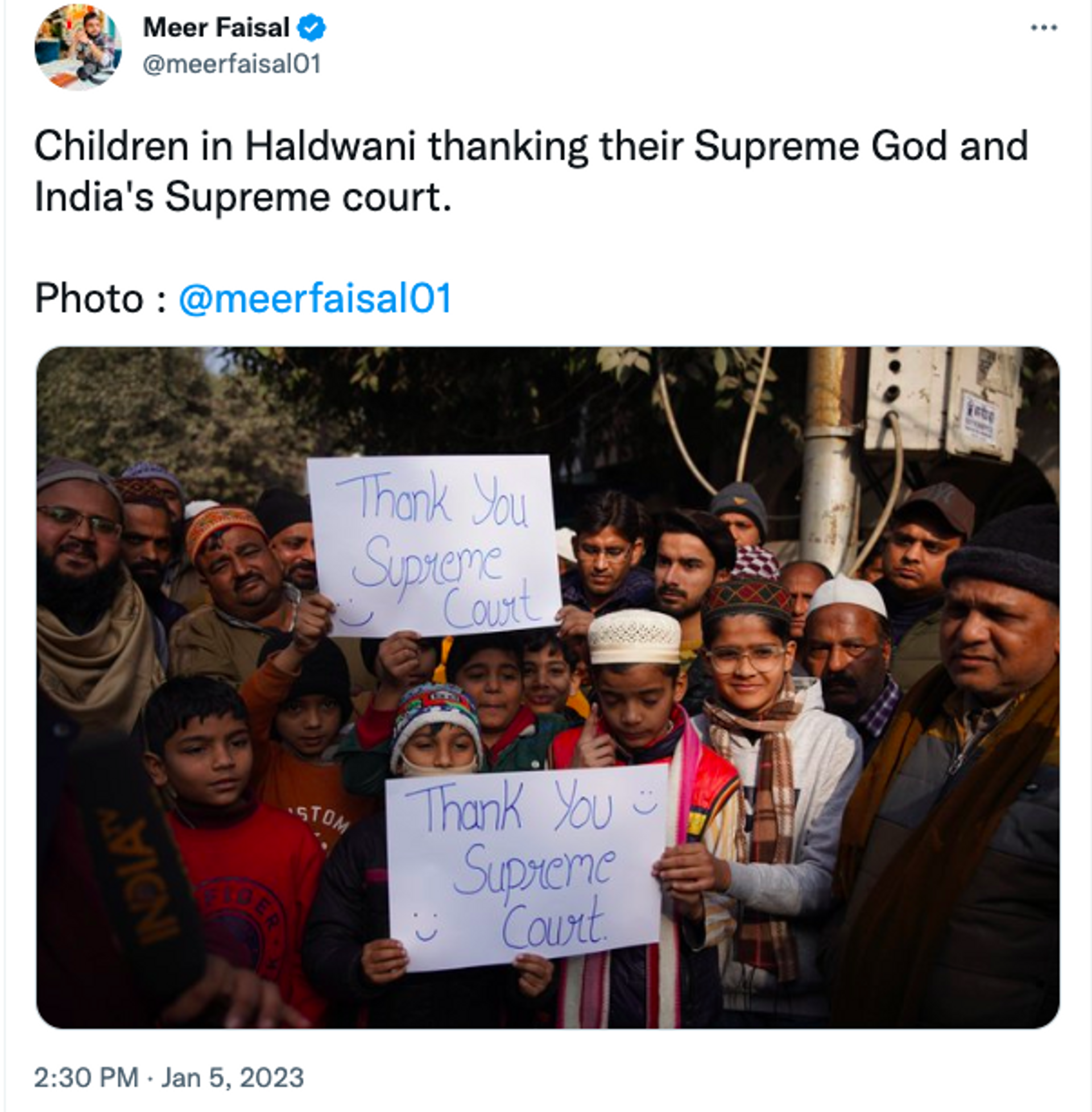https://sputniknews.in/20230106/why-eviction-of-50000-locals-in-uttarakhands-haldwani-district-sparked-outcry-404331.html
Why Eviction of 50,000 Locals in Uttarakhand's Haldwani District Sparked Outcry
Why Eviction of 50,000 Locals in Uttarakhand's Haldwani District Sparked Outcry
Sputnik India
Supreme Court on Thursday gave temporary relief to thousands of residents who were facing eviction threats from the Uttarakhand state government.
2023-01-06T15:11+0530
2023-01-06T15:11+0530
2023-01-06T20:41+0530
india
uttarakhand
uttaranchal
muslim
https://cdn1.img.sputniknews.in/img/07e7/01/06/409220_0:160:3073:1888_1920x0_80_0_0_df23818c183c58dda2130850a1b92f78.jpg
"We have been living here for years, if we're illegally living then why do politicians come to seek votes from us," Sheela Bano, a resident of the Banbhoolpura area in the Haldwani district in India's Uttarakhand told Sputnik.Bano is one of 50,000 residents living in the area who received an eviction notice from the state authorities earlier in January.The 68-year-old said that her husband was born here, and died in 2019. She has been living in the house since 1978, and her three sons and a daughter were also born here."Now, suddenly the state government feels that we've been illegally living for decades. I have water and electricity bills to prove that the government recognized us as residents of this area," Bano stressed."If our home is demolished, where will we go?" Bano added.Thousands of residents of Banbhoolpura, a slum and predominantly Muslim area, received an eviction notice after the state's High Court on December 20 gave the order.The High Court order came after Public Interest Litigation (PIL) claiming that 4,365 houses adjacent to a railway line in the Banbhoolpura colony were "illegal" and, therefore, had to be demolished.However, on Thursday, the Supreme Court gave respite to the residents, as it put a hold on the state High Court's demolition order, saying: "There cannot be uprooting of 50,000 people overnight. There has to be segregation of people who have no right on the land and the need for rehabilitation while recognizing the need for the railways." The matter will be heard on February 7.The Supreme Court, in its order, stressed that no one can pass "a blanket order for the entire locality."As the residents received the eviction notice, they began protesting - including women and children.But the Bharatiya Janata Party-led state government maintains that since it's government land, it will abide by the court's order. "It is a railway land. We will proceed as per the court's order."Sahu claims to have settled here in 1971.Another resident, Mohammad Waris, said that his family settled during the partition (around 1947). He claimed: "Our home is not illegal. I have documents to prove that my grandparents settled here."Meanwhile, many residents also claimed that their houses were constructed in the area under Pradhan Mantri Awas Yojna in 2015 (PM residential development scheme), and that the Uttarakhand civic body transferred funds to their bank accounts for house construction.How It All StartedThe whole matter started with Public Interest Litigation (PIL) filed in 2007, seeking a direct train link between Uttarakhand's Nainital and Uttar Pradesh's Allahabad district. At the time, the railway said it did not have land to lay a track, after which the High Court ordered the demolition of some structures near the existing railway track, including houses in the Banbhoolpura area, so that a new route could be built.In 2013, social activist Ravi Shankar Joshi filed another PIL in the state High Court demanding action against officials responsible for a bridge collapse in Banbhoolpura. Joshi, in his petition, did not seek eviction of the inhabitants of the locality.Following Joshi's petition, the court formed a committee for the report, which said the bridge collapsed due to illegal mining around the railway track. The railway, in its affidavit, alleged that people had illegally settled on 29 acres of its land and were responsible for illegal mining in the Gola River.In 2016, taking cognizance of the railway's affidavit, the High Court ordered the state government to clear the encroachment. The state government in 2017 asked the High Court to review its decision, but the matter was dismissed.The issue then remained stuck among the state government, Supreme Court, and High Court, and then due to COVID, the matter became suspended and on December 20, the state High Court passed a judgment ordering the demolition of more than 4,000 houses in the area.One of the main reasons for the decision was also that "a railway line in Haldwani was built as early as the year 1884, and it was later transferred to the Government of India in 1943," the High Court noted in its verdict.
india
uttarakhand
uttaranchal
Sputnik India
feedback.hindi@sputniknews.com
+74956456601
MIA „Rossiya Segodnya“
2023
Deexa Khanduri
https://cdn1.img.sputniknews.in/img/07e6/0c/13/138923_52:0:533:481_100x100_80_0_0_cadf23d341691fc65ff2b22fd1afe584.jpg
Deexa Khanduri
https://cdn1.img.sputniknews.in/img/07e6/0c/13/138923_52:0:533:481_100x100_80_0_0_cadf23d341691fc65ff2b22fd1afe584.jpg
News
en_IN
Sputnik India
feedback.hindi@sputniknews.com
+74956456601
MIA „Rossiya Segodnya“
Sputnik India
feedback.hindi@sputniknews.com
+74956456601
MIA „Rossiya Segodnya“
Deexa Khanduri
https://cdn1.img.sputniknews.in/img/07e6/0c/13/138923_52:0:533:481_100x100_80_0_0_cadf23d341691fc65ff2b22fd1afe584.jpg
banbhoolpura, haldwani, uttarakhand, india, eviction notice,
banbhoolpura, haldwani, uttarakhand, india, eviction notice,
Why Eviction of 50,000 Locals in Uttarakhand's Haldwani District Sparked Outcry
15:11 06.01.2023 (Updated: 20:41 06.01.2023) Deexa Khanduri
Sputnik correspondent
India's top court on Thursday gave temporary relief to thousands of residents who were facing an eviction threat from the Uttarakhand state government.
"We have been living here for years, if we're illegally living then why do politicians come to seek votes from us," Sheela Bano, a resident of the Banbhoolpura area in the Haldwani district in India's Uttarakhand told Sputnik.
Bano is one of 50,000 residents living in the area who received an eviction notice from the state authorities earlier in January.
The 68-year-old said that her husband was born here, and died in 2019. She has been living in the house since 1978, and her three sons and a daughter were also born here.
"Now, suddenly the state government feels that we've been illegally living for decades. I have water and electricity bills to prove that the government recognized us as residents of this area," Bano stressed.
"If our home is demolished, where will we go?" Bano added.
Thousands of residents of Banbhoolpura, a slum and predominantly Muslim area, received an eviction notice after the state's High Court on December 20 gave the order.
The High Court order came after Public Interest Litigation (PIL) claiming that 4,365 houses adjacent to a railway line in the Banbhoolpura colony were "illegal" and, therefore, had to be demolished.
However, on Thursday, the Supreme Court gave respite to the residents, as it put a hold on the state High Court's demolition order, saying: "There cannot be uprooting of 50,000 people overnight. There has to be segregation of people who have no right on the land and the need for rehabilitation while recognizing the need for the railways." The matter will be heard on February 7.
The Supreme Court, in its order, stressed that no one can pass "a blanket order for the entire locality."
As the residents received the eviction notice, they began protesting - including women and children.
But the Bharatiya Janata Party-led state government maintains that since it's government land, it will abide by the court's order. "It is a railway land. We will proceed as per the court's order."
Shiv Charan Sahu, a 70-year-old Hindu shopkeeper, in the area, said: "There are three government schools, a public health center, a water tank is present in the area. All are government-run. How could the state government overlook their own structure or presence?"
Sahu claims to have settled here in 1971.
Another resident, Mohammad Waris, said that his family settled during the partition (around 1947). He claimed: "Our home is not illegal. I have documents to prove that my grandparents settled here."
Meanwhile, many residents also claimed that their houses were constructed in the area under Pradhan Mantri Awas Yojna in 2015 (PM residential development scheme), and that the Uttarakhand civic body transferred funds to their bank accounts for house construction.
The whole matter started with Public Interest Litigation (PIL) filed in 2007, seeking a direct train link between Uttarakhand's Nainital and Uttar Pradesh's Allahabad district.
At the time, the railway said it did not have land to lay a track, after which the High Court ordered the demolition of some structures near the existing railway track, including houses in the Banbhoolpura area, so that a new route could be built.
In 2013, social activist Ravi Shankar Joshi filed another PIL in the state High Court demanding action against officials responsible for a bridge collapse in Banbhoolpura. Joshi, in his petition, did not seek eviction of the inhabitants of the locality.
Following Joshi's petition, the court formed a committee for the report, which said the bridge collapsed due to illegal mining around the railway track. The railway, in its affidavit, alleged that people had illegally settled on 29 acres of its land and were responsible for illegal mining in the Gola River.
In 2016, taking cognizance of the railway's affidavit, the High Court ordered the state government to clear the encroachment. The state government in 2017 asked the High Court to review its decision, but the matter was dismissed.
The issue then remained stuck among the state government, Supreme Court, and High Court, and then due to COVID, the matter became suspended and on December 20, the state High Court passed a judgment ordering the demolition of more than 4,000 houses in the area.
One of the main reasons for the decision was also that "a railway line in Haldwani was built as early as the year 1884, and it was later transferred to the Government of India in 1943," the High Court noted in its verdict.




